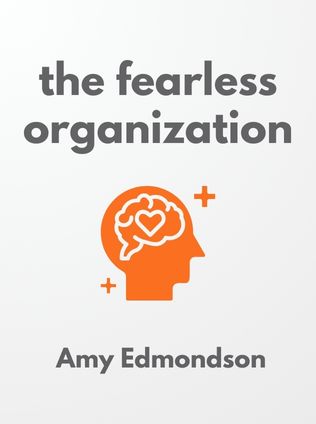
The Fearless Organization
Creating Psychological Safety in the Workplace for Learning, Innovation, and Growth
By Amy Edmondson
Published 11/2018
About the Author
Amy C. Edmondson is the Novartis Professor of Leadership and Management at the Harvard Business School. Throughout her academic career, Edmondson has focused on creating work environments that foster collaboration and enable people to perform at their best. Her work is widely recognized for its impact on leadership and organizational behavior. Edmondson’s seminal research on psychological safety has been influential in shaping how organizations approach team dynamics, learning, and innovation. Her book, The Fearless Organization: Creating Psychological Safety in the Workplace for Learning, Innovation and Growth, offers practical insights and strategies for building safer and more productive work environments.
Main Idea
The Fearless Organization centers on the concept of psychological safety and its crucial role in modern workplaces. Edmondson argues that the traditional culture of "fitting in" and "going along" is detrimental to success in today’s knowledge economy. Instead, she promotes a culture where individuals feel safe to voice their thoughts, ask questions, and admit mistakes without fear of negative consequences. This psychological safety is essential for fostering continuous learning, innovation, and high performance within teams and organizations.
Table of Contents
- The Power of Psychological Safety
- The Underpinning
- Psychological Safety
- The Paper Trail
- Psychological Safety at Work
- Avoidable Failure
- Unreachable Goal, Culture of Fear
- Dangerous Silence
- The Fearless Workplace
- Creating a Fearless Organization
- Making It Happen
- How to Set the Stage for Psychological Safety
- How to Invite Participation
- How to Respond Productively to Voice –– No Matter Its Quality
The Power of Psychological Safety
The Underpinning
Edmondson begins with a poignant story involving a neonatal nurse practitioner, Christina Price, who hesitated to question a senior doctor about a critical treatment for premature twins. This hesitation, born out of fear of reprimand, illustrates the potential dangers of not having a psychologically safe environment. As Edmondson explains, "The problem with sitting on our hands and staying within the lines rather than speaking up is that although these behaviors keep us personally safe, they can make us underperform and become dissatisfied. They can also put the organization at risk."
"Airplanes have crashed, financial institutions have fallen, and hospital patients have died unnecessarily because individuals were, for reasons having to do with the climate in which they worked, afraid to speak up." – Amy C. Edmondson
This narrative sets the stage for exploring the fundamental need for psychological safety in workplaces, where people feel secure enough to express concerns and suggest ideas without fearing negative repercussions.
Sign up for FREE and get access to 1,400+ books summaries.
You May Also Like
The Subtle Art of Not Giving a F*ck
A Counterintuitive Approach to Living a Good Life
By Mark MansonHow To Win Friends and Influence People
The All-Time Classic Manual Of People Skills
By Dale CarnegieFreakonomics
A Rogue Economist Explores the Hidden Side of Everything
By Steven D. Levitt and Stephen J. DubnerQuiet: The Power of Introverts
The Power of Introverts in a World That Can't Stop Talking
By Susan Cain



















